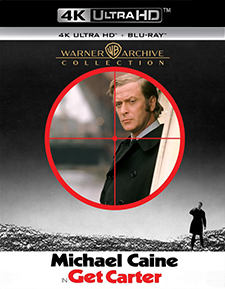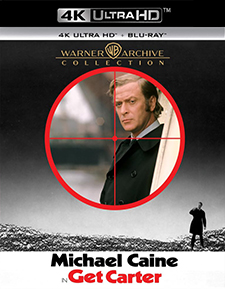Get Carter (4K UHD Review)

Director
Mike HodgesRelease Date(s)
1971 (August 26, 2025)Studio(s)
MGM-British Studios (Warner Archive Collection)- Film/Program Grade: A
- Video Grade: A+
- Audio Grade: A+
- Extras Grade: A-
Review
“What are you going for?”
“To find out what happened.”
“Some hard nuts operate up there, Jack. They won’t take kindly to someone from London poking his bugle in.”
“Too bad.”
“The law was satisfied.”
“Since when was that good enough?”
“Think again, Jack.”
“I will.”
So begins gangster Jack Carter’s downward spiral in Mike Hodges’ 1971 classic Get Carter, considered one of the greatest British gangster films ever made. Based upon Jack’s Return Home by crime fiction novelist Ted Lewis, it further cemented Michael Caine’s star status, having already appeared in Zulu, the Harry Palmer series, Alfie, and The Italian Job, among other films. Despite a mixed reception from critics at the time who were put off by the film’s tone and its use of violence, it had a decent theatrical run and somewhat of a cult status before being completely re-evaluated in the late 1990s as the masterpiece that it is.
Jack Carter (Caine) has lived in London for many years under the employ of a local crime boss, but must return to home to Newcastle to attend his brother Frank’s funeral, who died under what Jack believes are mysterious circumstances. Though his boss warns him not to muddy the local waters, Jack arrives in town and takes up residence, immediately investigating Frank’s death while also checking upon his niece Doreen (Petra Markham). His inquiries lead him to Eric (Ian Hendry) who works for Cyril (John Osborne), kingpin for the area, neither of whom give him any satisfactory answers. Jack has been having an affair with his boss’ wife Anna (Britt Ekland), but he also becomes entangled with Glenda (Geraldine Moffat), a free-spirited party girl who seems to be a liaison between the local syndicates. As he gets closer to the truth, Jack’s boss sends two of his men, Con McCarty (George Sewell) and Peter the Dutchman (Tony Beckley), to bring him back to London, but his refusal will ultimately lead him down a dark and deadly path of self-destruction. Also among the cast are Bryan Mosley, Alun Armstrong, Bernard Hepton, Glynn Edwards, Dorothy White, John Bindon, Terence Rigby, and Rosemarie Dunham.
One of the most interesting aspects of Get Carter is the lead character himself. It’s not because he’s mostly cool and calm in most situations, but because he’s exactly what everybody says he is: a bastard. Jack Carter is not somebody you would necessarily have anything to do with in reality. He’s a gangster, a very experienced one, without many sympathies. However, because it’s Michael Caine in the role, he comes off as charismatic and charming, the kind of character you want to hang around at the cinema with for two hours. It’s in his nature to steamroll over and disappoint others. As the audience, we feel the same way, watching him go deeper into this rabbit hole, and knowing that there cannot be a positive outcome. He goes from showing his niece Doreen the utmost of respect and tenderness to sleeping with random women, even occasionally doing violence against them if they have something he might want or need. So they’re all correct, he is a bastard, but we’re unable to stray from watching him because it’s Michael Caine.
We also get the idea that Jack has been away from home for quite some time, especially since he seems to have lost his Geordie accent. In reality, Michael Caine has a patented Cockney accent, but it actually plays into the film without it really being spoken of. It’s a part of the fabric, like many things in the film that often go unacknowledged or hinted at. We’re presented with this world without really getting deep into the hierarchies or backstories. We don’t even get a whole lot of information about the relationship between Jack and his dead brother Frank. As the story unfolds, we learn things without having to be explicitly told them, and it’s a refreshing pace as so many modern films, whether in their scripts or through the offscreen dubbing of expository dialogue, must be told all of the details about the characters and the world they inhabit. Get Carter respects its audience’s intelligence to work it out for themselves, leaving breadcrumbs for us to follow.
Performances are strong across the board, combined with Wolfgang Suschitzky’s terrific cinematography, giving an honest and naturalistic portrayal of the look of early 1970s Newcastle without giving into the temptation of romanticizing it. Roy Budd’s signature electronic piano and harpsichord-driven score is superlative, from the opening theme to the final confrontations during the finale. The violence is akin to Martin Scorsese’s work in Mean Streets and Taxi Driver, in which it’s usually hard-hitting but brief, but critics at the time were caught off guard by. Combined with Mike Hodges careful direction and Get Carter truly is one of the best gangster films ever made. Film fans continue to debate whether it or The Long Good Friday should have the crown as the all-time best, but in either case, it’s very fine company to be in.
Get Carter was shot by cinematographer Wolfgang Suschitzky on 35mm film with Panavision R-200° cameras and spherical lenses, finished photochemically, and presented in the aspect ratio of 1.85:1. The Warner Archive Collection debuts the film on Ultra HD in the US from a 2022 4K 16-Bit restoration of the original camera negative carried out by the British Film Institute (BFI) and overseen by director Mike Hodges, which has been graded for High Dynamic Range in Dolby Vision and HDR10, encoded by David Mackenzie of Fidelity in Motion, and presented on a triple-layered BD-100 disc. The UK release of the film by the BFI themselves quickly went out print, but Warner Archive has resurrected this dynamic and highly organic 4K presentation of the film. Only a minor stray scratch or here or there is all that mars this outstanding picture with a finely-tuned grain structure and bitrates that often sit in the 80 to 100Mbps range, frequently rising far above that. This isn’t a film with a vast color palette as it mostly takes places in dirty and overcast monochromatic environments, but there are moments where the HDR brings out the lushness in the occasional foliage, costumes, and indoor environments. Where it truly exceeds is in the shadows, allowing for rich, velvety blacks without an ounce of crush to them, and perfect contrast. The picture is stable and crisp with nary an imperfection to be found. In other words, it’s gorgeous. As a minor note, this release also features the original 1970s-era MGM logo.
Audio is included in English 2.0 mono DTS-HD Master Audio with optional subtitles in English SDH. The BFI release contained a single channel LPCM track, and from what I can gather, there isn’t much of a difference outside of being split into two channels. It’s a beautifully rendered track that thoroughly carries the film’s sound design, which is full of varying textures and subtleties, not to mention Roy Budd’s excellent score. Dialogue exchanges are clear and precise, and the overall track is clean with perfect fidelity.
The Warner Archive Collection 2-Disc 4K Ultra HD release of Get Carter sits in a black Amaray case alongside a 1080p Blu-ray featuring the same restoration, with an insert and a slipcover that re-uses elements from one of the film’s original US theatrical release posters. The following extras are included on both discs:
- Audio Commentary with Michael Caine, Mike Hodges, and Wolfgang Suschitzky
- Audio Commentary with Kim Newman and Barry Forshaw
- 2022 Introduction by Michael Caine (HD – 2:30)
- Mike Hodges in Conversation (HD – 60:12)
- The Sound of Roy Budd with Jonny Trunk (HD – 17:07)
- Don’t Trust Boys (HD – 21:53)
- Klinger on Klinger (HD – 24:09)
- 1971 Original Release Trailer (Upscaled SD – 2:41)
- 1971 Michael Caine Newcastle Premiere Intro (Upscaled SD – :46)
- 1971 Music Trailer with Roy Budd (Upscaled SD – 3:41)
- 2022 BFI Re-Release Trailer (HD – 1:31)
The first commentary was recorded in 2000 with with Michael Caine, director Mike Hodges, and cinematographer Wolfgang Suschitzky. It’s a bit choppy as they’ve been recorded separately and pieced together later, leaving some gaps in between their comments, but it’s invaluable for the insight that it offers. The second commentary was recorded in 2022 with film critics Barry Forshaw and Kim Newman, and in their usual fashion, they dutifully delve into the film’s production, its place within British cinema history in comparison to other films, and the backgrounds of the cast and crew. In the 2022 introduction by Michael Caine, he expresses his appreciation for the film and hopes that new audiences continue to enjoy it. Mike Hodges in Conversation is a live audience Q&A at the BFI Southbank theatre in London in May of 2022. The Sound of Roy Budd features film music expert Jonny Trunk speaking about the work and tragic life of composer Roy Budd, who didn’t live long enough to see his work revitalized in the late 1990s. Don’t Trust Boys speaks with actress Petra Markham about her background and her career mostly playing young people, as well as her process working on the film. In Klinger on Klinger, producer Michael Klinger’s son Tony Klinger discusses his father’s career as a cinema owner and later a producer, aspiring to make more respectable films, and working with his father on some of them. (It’s a shame that his documentary The Man Who Got Carter couldn’t be included.) Last are the film’s original trailer, Michael Caine’s introduction to the film for its premiere, a music trailer featuring Roy Budd playing the film’s score live to picture, and the BFI’s 2022 re-release trailer.
The Limited Edition BFI release from 2022 offered a few things that didn’t port over to this release, including an isolated score audio track in 1.0 LPCM; a brief archival BBC Look North Location Report about the film; The Ship Hotel: Tyne Main, a short film about a pub on the banks of the River Tyne; and a Script Gallery. Within that package was a double-sided poster; a set of four art cards; and an 80-page booklet containing essays by Mark Kermode, Tim Pelan, John Oliver, and Jason Wood; Alex Cox’s introduction to the Moviedrome 1990 airing of the film; and restoration notes by the BFI’s Douglas Weir.
Despite not all of the material from BFI’s release of the film carrying over, Warner Archive’s 4K UHD release of Get Carter is most definitely a disc to own. It continues to be a terrific film that only gets better with age, and it looks better than it ever has on home video. Highly recommended.
- Tim Salmons
(You can follow Tim on social media at these links: Twitter, Facebook, BlueSky, and Letterboxd. And be sure to subscribe to his YouTube channel here.)

